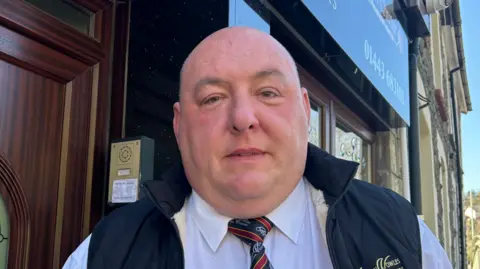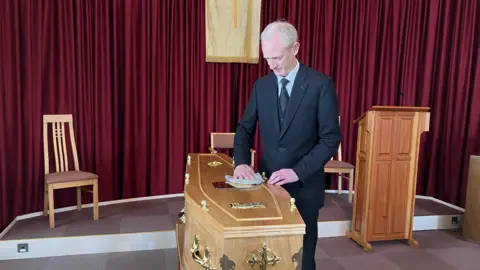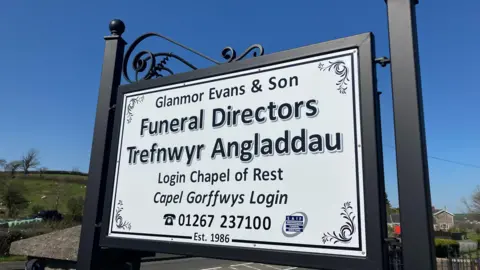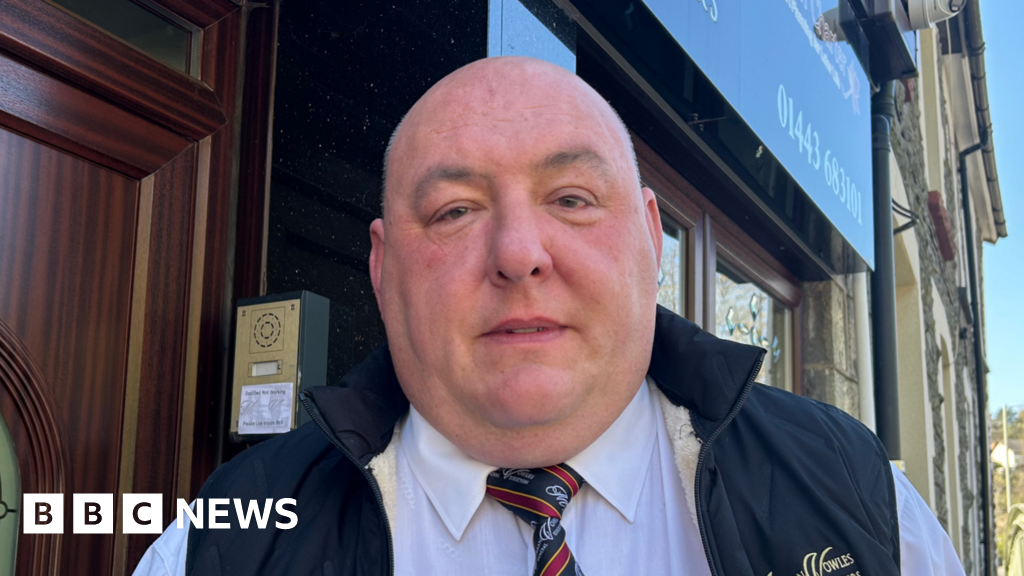BBC News
 BBC
BBCFamilies are unable to say goodbye to loved ones because of changes to death certificates which has also led to overcrowded mortuaries, a funeral director has said.
Geraint Griffith said it was taking between 10 and 20 days for bodies to arrive due to the new system, introduced in September, which he said made it hard to make them look presentable for loved ones.
Overcrowding has also led to hundreds of bodies being moved to other mortuaries in the past six months, and Mr Griffith said families were not being informed.
The lead medical examiner for Wales said he was working “tirelessly” to address any delays.
Under the new system, partially introduced in response to the deaths caused by serial killer doctor Harold Shipman, all deaths not investigated by a coroner must be reviewed independently by a medical examiner before a death certificate can be issued.
Mr Griffith, a funeral director in Pontypridd, Rhondda Cynon Taf, said: “It’s wrong for families who can’t say goodbye to their loved ones.
“There’s no other way to say it, they’re absolutely devastated.”
He said it would previously take about three or four days for a body to be released from a hospital mortuary to a funeral director, but this was now taking 10 to 20 days.
“I’ve had to turn families away from coming to the chapel of rest because I can’t make their loved ones presentable enough because of the length of time between the passing and the registration.
“It’s very traumatic for them and it’s causing families to have lots of anxiety, lots of stress and pain. It doesn’t need to happen.”
As a result of the delays, health boards are having to move bodies between hospitals to ensure morgues do not exceed capacity.
Cwm Taf Morgannwg health board, which covers Rhondda Cynon Taf, Bridgend and Merthyr Tydfil, moved approximately 500 deceased patients between September and mid March, according to a BBC Wales Freedom of Information (FOI) request.
The health board said this was caused by “extreme pressure due to increased length of stay”, adding it appreciated the time after death was “distressing” for families and that its priority during transportation was to “maintain the dignity of that person”.
Mr Griffith said he was not surprised bodies were being moved, but was shocked families were not being told.
“I think if families knew exactly – the transportation and moving sometime 20 to 25 miles from one hospital to another – I don’t think they would approve of that.
“And again, during the transportation period they’re unrefrigerated,” he said.
Elsewhere, Aneurin Bevan health board said it had moved 229 bodies between mid September and late February, Swansea Bay 98 and Hywel Dda 21.
Cardiff and Vale health board said it was “not possible” to provide a count and Betsi Cadawaldr said no persons had been moved due to shortage of space, only for post-mortem examinations.

Iwan Evans, a funeral director in Carmarthenshire, said there was no blame on mortuary staff or any specific health board, adding there was a “natural pressure” in the winter months due to an increase in deaths.
But he said the lack of capacity in hospital mortuaries was “definitely” a direct result of the “bureaucratic” medical examiner system.
“When we’re alive, we trust the doctors, but then after death, this whole system is in place to review and monitor the doctor’s work.
“I don’t think it’s 100% suitable for them to review every single death.”
Health is devolved in Wales, but death certificates are not.
Mr Evans said the Welsh government should intervene.
“There are systems to take care of the deceased all over the world, but the situation we have is that our Senedd, where health has been devolved, is accountable to another parliament for this matter.”

Rachel Bradburne, of the National Association of Funeral Directors, said the “piecemeal” nature of the system was “frustrating” and the current system was “full of bottlenecks and delays”.
Jason Shannon, lead medical examiner for Wales, said he recognised the importance of “seamless and timely death certification”.
“We sympathise with any loved ones experiencing delays and we are working tirelessly with all professionals and organisations involved in the death certification process to address any delays being experienced following new changes to the England and Wales death certificate system,” he added.
The Welsh government apologised to families who had experienced delays and said the changes were designed to “strengthen safeguard”.
It added it was working with the lead medical examiner, NHS and other organisations to provide additional support.
The Department of Health and Social Care said the changes supported “vital improvements to patient safety” and provide comfort and clarity to the bereaved.
“We recognise that there are significant regional variations, and we are actively monitoring these and working closely with the NHS and the Welsh government to swiftly address them.”

